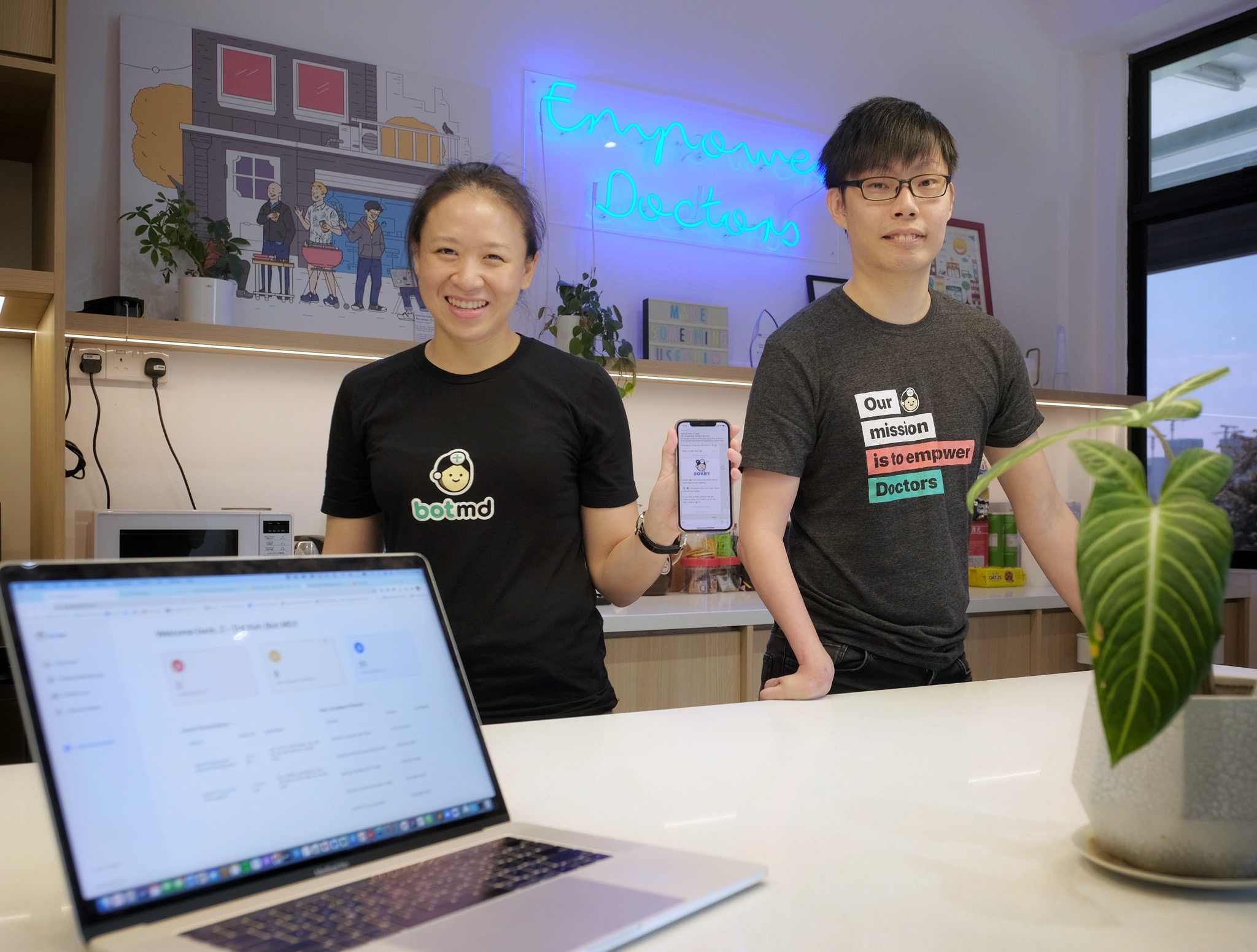AI bot helps doctors to prioritise attention to urgent Covid-19 cases on home recovery
Sign up now: Get ST's newsletters delivered to your inbox

Bot MD's chief executive officer and co-founder Dorothea Koh (left) and chief technology officer and co-founder Sim Yanchuan.
ST PHOTO: GAVIN FOO
SINGAPORE - An artificial intelligence bot which helps doctors and telemedicine providers to prioritise attention to urgent Covid-19 cases on home recovery could help them better manage their workload, amid the surge in local cases.
The platform, developed by local AI healthcare start-up BotMD, helps doctors to monitor their patients' vital signs - such as heart rate and oxygen levels - remotely.
Those who are enrolled in the programme will be required to periodically key in their vital signs via messaging apps like WhatsApp.
An alert is triggered to the doctor or nurse in-charge via SMS when the patient records an abnormal reading such as a low oxygen saturation.
Bot MD chief executive and founder Dorothea Koh said: "The Bot MD Care bot is therefore able to help doctors to triage these submissions to focus on patients who may require medical attention, which helps them to streamline their telemedicine operations."
With at least 16,000 patients placed on home recovery as at Saturday (Oct 16), many telemedicine providers and hospitals have been contacting each patient manually to get a health update, noted Ms Koh.
The platform would be more convenient and time-saving, she added.
Home recovery is now the default care arrangement model for all Covid-19 patients, except for several vulnerable groups.
One of its partners, the National University Health System (NUHS), has begun working with Bot MD on a pilot programme to monitor selected patients who are recovering from Covid-19 at home.
Since the start of the month, more than 80 have been enrolled, said its spokesman.
The bot has been trained to answer basic questions on home recovery, such as discharge criteria.
Automated prompts and reminders can be set to ensure that patients comply with reporting their vital signs, said Ms Koh.

The National University Health System has begun working with BotMD on a pilot programme to monitor selected patients who are recovering from Covid-19 at home.
PHOTOS: BOT MD
A previous iteration of the bot was launched in June last year - in just two weeks - amid the surge in Covid-19 cases in migrant worker dormitories.
Jointly developed with NUHS, the bot - known as SGDormBot - helped to remind infected residents to monitor their temperature, heart rate and oxygen levels in their native languages.
NUHS clinicians were alerted to any abnormalities and could intervene quickly through telehealth consultations.
The bot was used in six dormitories - Sungei Tengah Lodge, Tuas South Dormitory, Acacia Lodge, Kian Teck Hostel, Kian Teck Dormitory and SCM Tuas Lodge.
Once the project was concluded, the clinicians came up with a research paper reviewing the use of the bot in the dorms. It was published in December last year in the British Medical Journal.
The study found that 85 per cent of the dorm residents had reported their vital signs. Among those with abnormal readings, 96 teleconsultations were initiated. Seven cases were escalated to emergency services while 18 were identified for on-site physical consultations.
"One of our main takeaways from the study was that engagement with the bot was very high, and that it could be used for managing chronic diseases," said Ms Koh.
This inspired the team to tweak and improve their platform, such as by making it more user-friendly.
The company then partnered Alexandra Hospital and NUHS CareHub - a post-discharge transitional care programme - to monitor patients with hypertension and diabetes.
In all, more than 4,000 patients in Singapore were tracked for both Covid-19 and these chronic conditions.
As many users are familiar with WhatsApp, the take-up rate among seniors has also been high, with the average age of users being 65, she noted.
The overall compliance rate is over 90 per cent, said Ms Koh.
Since May, the company has worked with hospitals in Indonesia to roll out its bot. "Many nurses were getting Covid-19, there was a manpower crunch and there was a large patient population. Our bot helped them to prioritise those who needed help," she added.
The company is in discussions to expand the Bot MD Care platform to help monitor patients with tuberculosis, growth stunting and HIV within the primary care setting.
Moving forward, the company is looking to expand its reach to more hospitals and telemedicine providers here and markets in South-east Asia.


